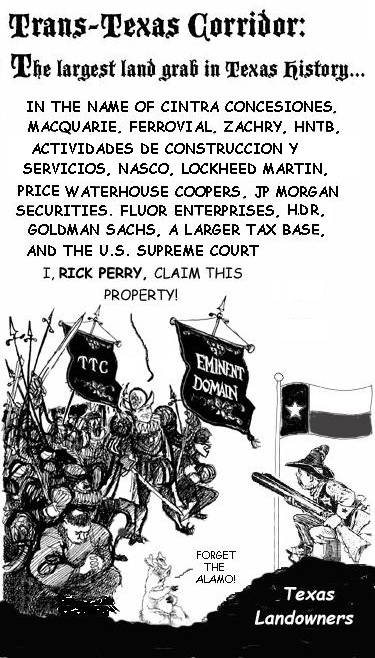"Texas SB 18 expands the number of entities who can take your land."
Buyer beware: Perry’s eminent domain bill a disaster for landowners

1/12/11
Terri Hall
Examiner.com
Copyright 2010
Stop the presses...Rick Perry declared a state of emergency over eminent domain. Yet, no one, not even the press, believes Perry sincerely wants genuine eminent domain reform to protect property owners from abuses and takings for private gain. Declaring it an “emergency” allows the bill to be on a fast track, which is perhaps by design to avoid needed scrutiny.
Ever since the Ft. Worth Star-Telegram Mike Norman expose’ of Rule 37 abuses by oil and gas companies hit the fan a week ago, is it any wonder that the Perry-inspired eminent domain bill, SB 18, being carried by senators Craig Estes and Robert Duncan is a handout to oil and gas firms and declared an “emergency”?
In another part of the Texas, in case you haven’t heard of it yet, the Keystone tarsands oil pipeline project is creating a Trans Texas Corridor level uprising in East Texas, and many landowners are already at war with both our state and federal government about the safety of the pipeline, the eminent domain abuses by TransCanada, the company perpetrating the project, and the gestapo tactics (threats, trespassing) employed by a private company emboldened by Texas’ weak eminent domain laws for a project that hasn’t even been environmentally cleared yet. They know the tidal wave of opposition is coming and they had better change the eminent domain laws so that the oil and gas industry can continue its land-grabbing abuses of property rights.
Did I mention that another tarsands oil pipeline is part of the Trans Texas Corridor known as Ports to Plains through west-central Texas? In fact, the Alberta government (the northern link for the pipeline) is formulating a monitoring system for the risky oil sands type pipeline in anticipation of potential leaks and hazards (think Deepwater Horizon oil spill), and the expected environmental impacts. So the timing of this bill is strategic and necessary for Perry and the oil and gas industry as well as his friends like Spain-based Cintra, in the toll operating business, whose public private partnership (PPP) projects Perry promised to advance this session.
SB 18 expands the number of entities who can take your land by changing much of the language to include any “entity,” not just governmental entities with eminent domain authority. In fact, it removes the word "governmental" in many sections of the code, thus making it possible for Cintra or any other private toll operator or private developer to take your land for commercial purposes. The urban blight exception is WAY too broad and could be used to take anyone's land when a developer convinces government it can make them more money off a hotel than on an existing older home.
You cannot trust Rick Perry on property rights. The reason we don't have property protection now is because Rick Perry's minions have watered down EVERY eminent domain bill since the Kelo decision to benefit Perry's cronies. Now he wants to rush it through to avoid genuine reform once the public backlash mounts. Start calling your representatives now...we don't want Rick Perry's version of eminent domain "reform"!
© Examiner.com: www.examiner.com
To search TTC News Archives clickHERE
To view the Trans-Texas Corridor Blog clickHERE


1/12/11
Terri Hall
Examiner.com
Copyright 2010
Stop the presses...Rick Perry declared a state of emergency over eminent domain. Yet, no one, not even the press, believes Perry sincerely wants genuine eminent domain reform to protect property owners from abuses and takings for private gain. Declaring it an “emergency” allows the bill to be on a fast track, which is perhaps by design to avoid needed scrutiny.
Ever since the Ft. Worth Star-Telegram Mike Norman expose’ of Rule 37 abuses by oil and gas companies hit the fan a week ago, is it any wonder that the Perry-inspired eminent domain bill, SB 18, being carried by senators Craig Estes and Robert Duncan is a handout to oil and gas firms and declared an “emergency”?
In another part of the Texas, in case you haven’t heard of it yet, the Keystone tarsands oil pipeline project is creating a Trans Texas Corridor level uprising in East Texas, and many landowners are already at war with both our state and federal government about the safety of the pipeline, the eminent domain abuses by TransCanada, the company perpetrating the project, and the gestapo tactics (threats, trespassing) employed by a private company emboldened by Texas’ weak eminent domain laws for a project that hasn’t even been environmentally cleared yet. They know the tidal wave of opposition is coming and they had better change the eminent domain laws so that the oil and gas industry can continue its land-grabbing abuses of property rights.
Did I mention that another tarsands oil pipeline is part of the Trans Texas Corridor known as Ports to Plains through west-central Texas? In fact, the Alberta government (the northern link for the pipeline) is formulating a monitoring system for the risky oil sands type pipeline in anticipation of potential leaks and hazards (think Deepwater Horizon oil spill), and the expected environmental impacts. So the timing of this bill is strategic and necessary for Perry and the oil and gas industry as well as his friends like Spain-based Cintra, in the toll operating business, whose public private partnership (PPP) projects Perry promised to advance this session.
SB 18 expands the number of entities who can take your land by changing much of the language to include any “entity,” not just governmental entities with eminent domain authority. In fact, it removes the word "governmental" in many sections of the code, thus making it possible for Cintra or any other private toll operator or private developer to take your land for commercial purposes. The urban blight exception is WAY too broad and could be used to take anyone's land when a developer convinces government it can make them more money off a hotel than on an existing older home.
You cannot trust Rick Perry on property rights. The reason we don't have property protection now is because Rick Perry's minions have watered down EVERY eminent domain bill since the Kelo decision to benefit Perry's cronies. Now he wants to rush it through to avoid genuine reform once the public backlash mounts. Start calling your representatives now...we don't want Rick Perry's version of eminent domain "reform"!
© Examiner.com: www.examiner.com
To search TTC News Archives click
To view the Trans-Texas Corridor Blog click









